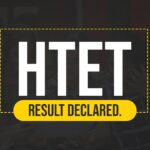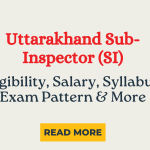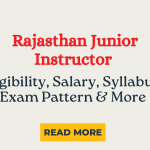The Kendriya Vidyalaya Sangathan (KVS) has released the KVS Syllabus 2024 for the PGT Posts. KVS has announced 13,404 openings for both teaching and non-teaching positions. Ahave been made available for teaching and non-teaching positions. All candidates preparing for the KVS Exam must thoroughly understand the syllabus and exam patterns. In this article, candidates will learn about KVS Recruitment 2024 syllabus.
KVS Recruitment 2024 Exam – Highlights
The table given below provides information about the KVS Recruitment Exam 2024 highlights for prospective candidates:
| Particulars | Details |
|---|---|
| Name of Organization | Kendriya Vidyalaya Sangathan |
| Total Vacancies | Various |
| Type of job | Central Government jobs |
| Job roles | Teacher (PGT, TGT, and PRT) |
| Registration mode | Online |
| Job Placement | Anywhere in India |
| Selection Criteria | Written exam and interview |
| Official Website | www.kvsangathan.nic.in |
KVS Exam Pattern 2024
Every candidate works hard to score the best marks in the exams, and exam pattern is the key. Candidates can check out the exam pattern of the KVS PGT exam given below:
| Paper | Subjects | Number of questions |
|---|---|---|
| Paper 1 | General English | 10 |
| General Hindi | 10 | |
| Paper 2 | Current Affairs | 10 |
| Reasoning and Numerical Ability | 10 | |
| Computer | 10 | |
| Paper 3 | Teaching Methodology | 10 |
| Paper 4 | Subject Concerned | 80 |
| Total | 150 questions |
KVS Recruitment 2024 Syllabus
KVS syllabus includes general English, General Hindi, Reasoning Ability, Computer Literacy, and others. It is time to familiarize yourself with the syllabus and prepare for the examination.
General English
- Reading comprehension
- Word power
- Grammar & usage
General Hindi
- समझबूझ कर पढ़ना
- शब्द की शक्ति
- व्याकरण और उपयोग
Current Affairs
- Awards
- Books & their authors
- Sports
- History- Ancient
- Medieval & Modern
- Geography
- Current Affairs
- Polity
- Economics
- Constitution
- Indian Art & Culture
- Everyday Science
- Scientific Research
- National/International Organizations /Institutions
Reasoning and Numerical Ability
- Verbal and non-verbal types
- Analogies
- Similarities
- Syllogism
- Space visualization
- Problem-solving
- Blood Relation
- Arithmetical reasoning
- Figure classification
- Logical Reasoning
- Mirror Image
- Directions
- Puzzles and Seating Arrangement
- Data Sufficiency
- Coding-decoding
- Order and Ranking
Computer Literacy
- Abbreviations
- Basic Computer Terminology & Shortcuts
- Web Technology
- Database Management Systems
- Browsers and Search Engines
- Internet
- General Concept of Social Networking
- Computer Memory or Storage Devices
- Computer Software & Hardware
- History and Evaluation of Computers
- Generations and Types of Computers
- Operating Systems
Understanding the Learner
- Concept of growth, maturation and development, principles and debates of development, development tasks and challenges
- Domains of Development: Physical, Cognitive, Socio-emotional, Moral etc., deviations in development and its implications.
- Understanding Adolescence: Needs, challenges and implications for designing institutional support.
- Role of Primary and Secondary Socialization agencies. Ensuring Home school continuity.
.
Understanding Teaching Learning
Theoretical perspectives on Learning -Behaviorism, Cognitivism and Constructivism with special reference to their implications for:
(i) The role of teacher
(ii) The role of learner
(iii) Nature of teacher-student relationship
(iv) Choice of teaching methods
(v) Classroom environment
(vi) Understanding of discipline, power etc.
Factors affecting learning and their implications for:
(i) Designing classroom instructions,
(ii) Planning student activities and,
(iii) Creating learning spaces in school.
Planning and Organization of Teaching-Learning
(i) Concept of Syllabus and Curriculum, Overt and Hidden Curriculum
(ii) Foundational Literacy and Numeracy, Early Childhood Care and Education
(iii) Competency based Education, Experiential learning, etc.
(iv) Instructional Plans: -Year Plan, Unit Plan, Lesson Plan
(v) Instructional material and resources
(vi) Information and Communication Technology(ICT) for teaching-learning
(vii) Assessment of learning, for learning and as learning: Meaning, purpose and considerations in planning each.
Enhancing Teaching Learning processes: Classroom Observation and Feedback, Reflections and Dialogues as a means of constructivist teaching.
Creating Conducive Learning Environment
- The concepts of Diversity, disability and Inclusion, implications of disability as social construct, types of disabilities-their identification and interventions
- Concept of School Mental Health, addressing the curative, preventive and promotive dimensions of mental health for all students and staff. Provisioning for guidance and counselling.
- Developing School and community as a learning resource.
School Organization and Leadership
- Leader as reflective practitioner, team builder, initiator, coach and mentor.
- Perspectives on School Leadership: instructional, distributed and transformative
- Vision building, goal setting and creating a School development Plan
- Using School Processes and forums for strengthening teaching learning-Annual Calendar, time-tabling, parent teacher forums, school assembly, teacher development forums , using achievement data for improving teaching —learning, School Self Assessment and Improvement
- Creating partnerships with community , industry and other neighboring schools and Higher Education Institutes — forming learning communities.
Perspectives in Education
- NEP-2020: Early Childhood Care and Education: The Foundation of Learning ; Foundational Literacy and Numeracy; Curriculum and Pedagogy in Schools: Holistic & Integrated Learning; Equitable and Inclusive Education: Learning for All; Competency based learning and Education.
- Guiding Principles for Child Rights, Protecting and provisioning for rights of children to safe and secure school environment, Right of Children to free and Compulsory Education Act, 2009,
- Historically studying the National Policies in education with special reference to school education;
- School Curriculum Principles: Perspective, Learning and Knowledge, Curricular Areas, School Stages — Pedagogy & Assessment.
Once candidates learn about the syllabus, they can begin preparing for their examinations immediately. Every applicant is trying to get their desired rank in exams, so understanding the syllabus is crucial.
Dhurina wishes all the best for upcoming exams.








